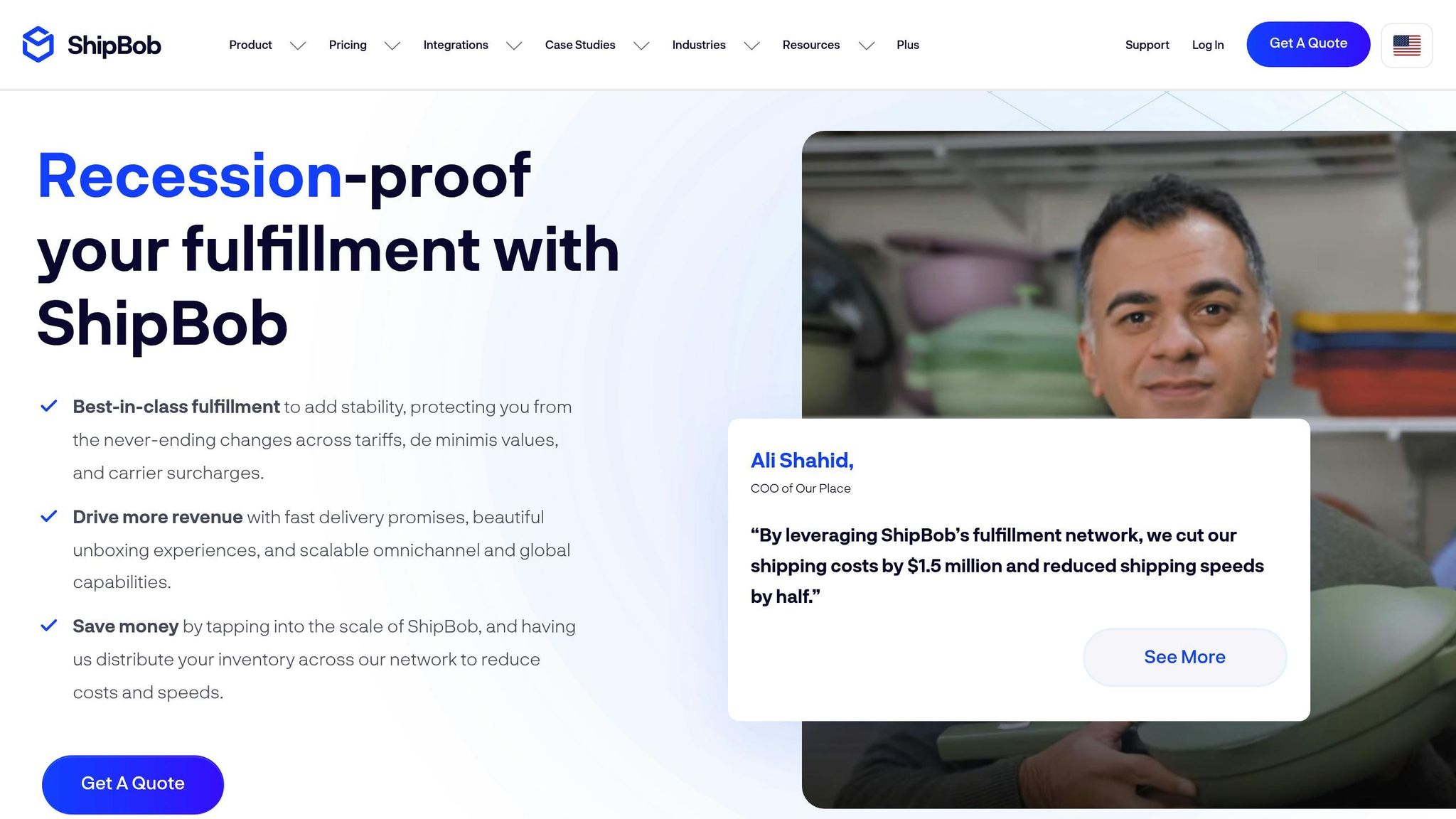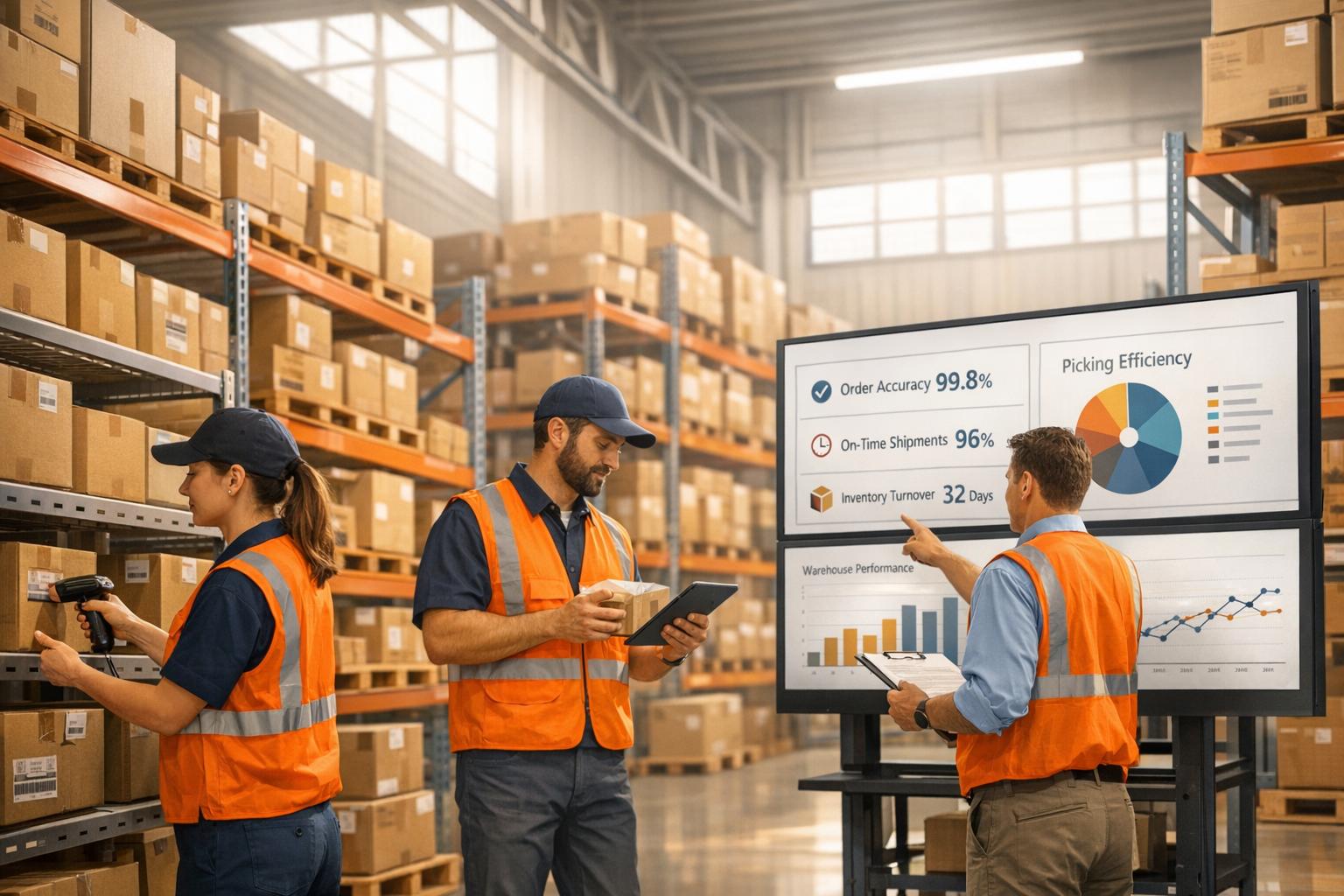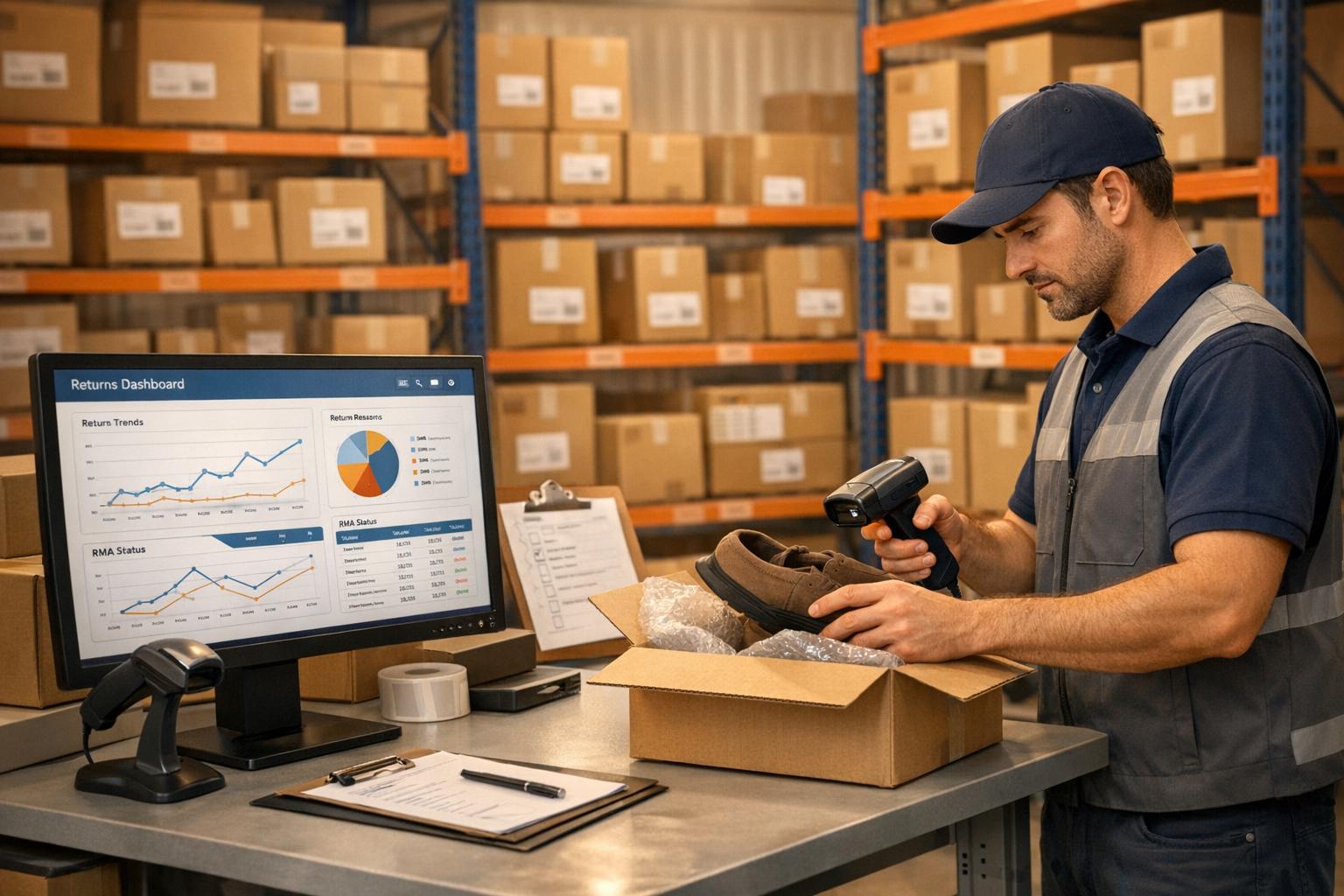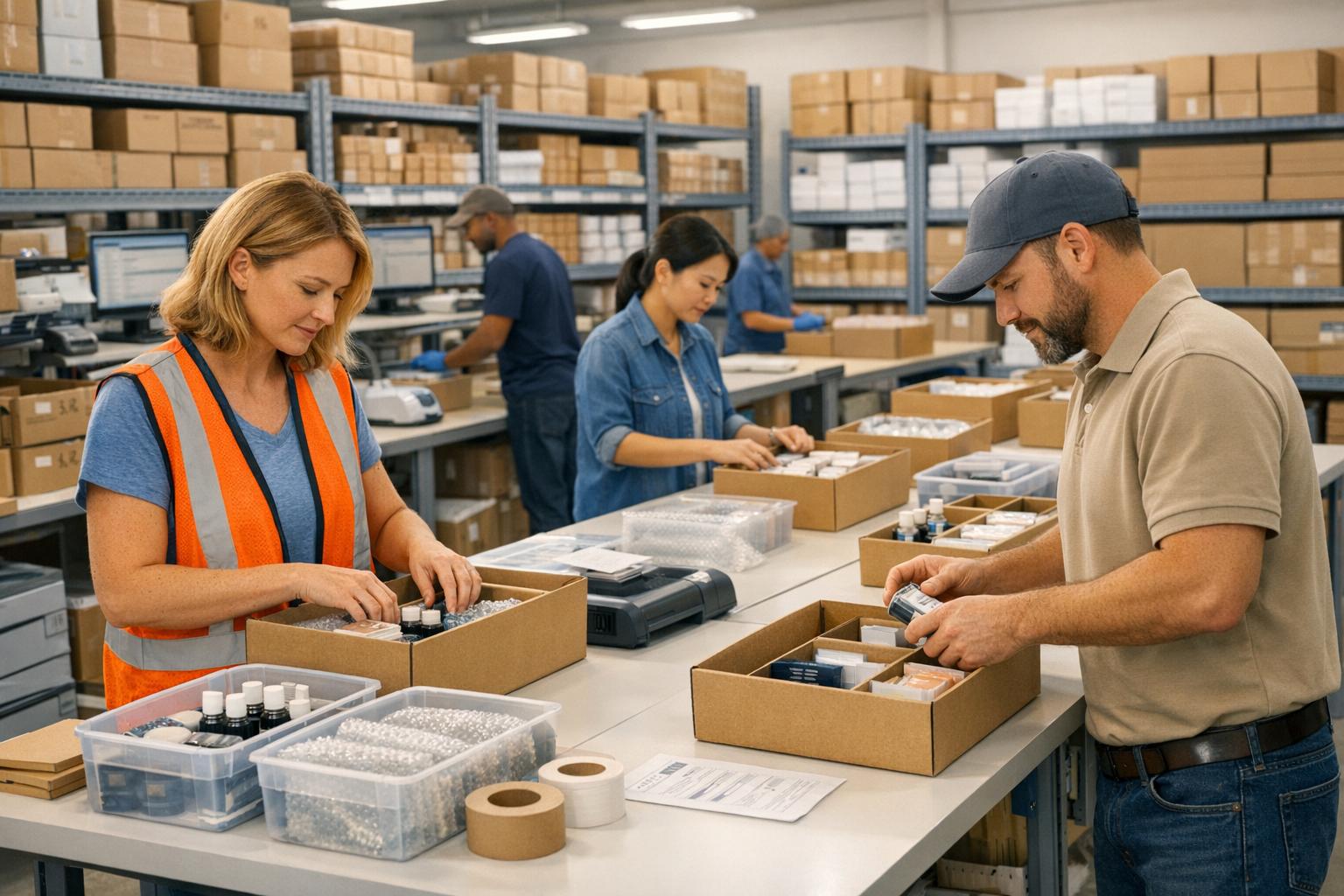3PL Services for Health & Wellness Companies: What to Look For

Outsourcing logistics is critical for health and wellness brands to handle sensitive products, maintain compliance, and meet customer expectations. Partnering with a specialized third-party logistics (3PL) provider offers solutions for regulatory challenges, temperature-controlled storage, and efficient order fulfillment. Here’s what to focus on when choosing the right 3PL:
- Regulatory Compliance: Ensure the provider meets FDA, Health Canada, and GMP standards, and offers batch tracking for recalls.
- Specialized Storage: Look for temperature-controlled facilities with advanced monitoring to protect sensitive products like supplements.
- Scalability: Choose a partner with a nationwide network and flexible warehouse capacity to handle growth and seasonal spikes.
- Technology Integration: Real-time inventory tracking, ERP connections, and automated systems streamline operations and improve accuracy.
- Additional Services: Kitting, custom packaging, and returns management enhance customer experience and operational efficiency.
Key takeaway: The right 3PL partner helps health and wellness companies focus on product development while ensuring logistics meet industry demands.
Tom Mucklow of Aurora Supplements | ShipBob Ecommerce Operators Series: Season 2, Episode 4

What to Look for When Choosing a 3PL Partner
Choosing the right third-party logistics (3PL) partner is a critical decision for health and wellness businesses. The provider you select will directly influence your ability to maintain product quality, meet strict regulations, and scale your operations effectively.
Growth and Flexibility Support
The health and wellness sector is booming. For example, the vitamins and supplements market is expected to grow from $56 billion in 2024 to $115.5 billion by 2034. With such rapid growth, your 3PL partner must be prepared to scale with your business while maintaining high service standards.
A nationwide network of strategically located warehouses is essential. This setup not only reduces shipping times but also helps cut transportation costs as your customer base expands.
"Scalability and flexibility are crucial to meet growing customer demands, delivering products quickly and expanding into other segments such as retail." - PBD Worldwide
Your 3PL should also offer flexible labor models and expandable warehouse capacity to handle seasonal demand spikes without requiring major upfront investments. Additionally, they should be able to adapt as your product offerings evolve. Whether you're introducing new formulations, branching into different wellness categories, or launching subscription services, your 3PL should seamlessly integrate these changes into their operations.
As your business grows, specialized storage and handling capabilities become increasingly important.
Specialized Storage and Handling
Many health and wellness products require specific storage conditions to maintain their quality and safety. For instance, temperature-controlled storage is essential for supplements, probiotics, and other products that can degrade or become unsafe if exposed to fluctuating temperatures.
Did you know nearly 20% of temperature-sensitive health products are damaged during transit due to cold chain failures? This highlights the importance of partnering with a 3PL that has reliable cold storage facilities and advanced monitoring systems.
Your 3PL should offer multiple temperature zones within their warehouses, tailored to the specific needs of your products. Their refrigeration systems must maintain consistent conditions, with monitoring systems that trigger alerts for any deviations. Real-time tracking ensures visibility across the entire supply chain - from storage to transportation - allowing proactive measures to protect product integrity.
"Expertise, technology, and unwavering compliance are the cornerstones of successful pharmaceutical logistics." - Hanzo Logistics
Experience matters, too. Whether your products include probiotics requiring refrigeration, herbal supplements sensitive to humidity, or controlled substances with strict security needs, the 3PL should have a proven track record of managing these specialized items. Beyond storage, strict adherence to regulatory standards is vital.
Regulatory Compliance and Certifications
The health and wellness industry operates under rigorous regulations, making compliance a non-negotiable factor when selecting a 3PL partner. Your provider must demonstrate a thorough understanding of regulatory requirements like FDA guidelines, Health Canada standards, and more.
For U.S. operations, FDA registration is mandatory for warehouses handling regulated products. Similarly, facilities in Canada must hold Health Canada licenses for pharmaceuticals and natural health products. Quality certifications like ISO 9001 and ISO 13485 signal strong quality management practices, while GMP-compliant warehouses follow strict protocols for cleanliness, temperature control, and documentation.
Your 3PL should also be equipped to handle recalls and inspections efficiently. This includes maintaining detailed lot-level records for batch tracking and supporting rapid recall procedures.'
-
Compliance Area
-
FDA Registration
- Required for U.S. warehouses handling regulated products
-
Health Canada Licensing
- Mandatory for Canadian facilities managing pharmaceuticals and health products
-
GMP Compliance
- Protocols for cleanliness, temperature control, and documentation
-
Quality Certifications
- ISO 9001 and ISO 13485 for consistent quality management
-
Batch Tracking
- Lot-level traceability and recall management capabilities
-
FDA Registration
Technology and System Integration
In today’s fast-paced market, seamless technology integration is essential for efficient operations. Your 3PL partner should offer advanced ERP and e-commerce platform integrations that connect directly to your existing systems.
Real-time inventory tracking is key to avoiding stockouts and overselling, while sophisticated order management systems can handle complex needs like subscription boxes, custom packaging, and multi-channel distribution. These systems should also optimize fulfillment by automatically routing orders to the best-suited warehouse based on inventory and shipping requirements.
For temperature-sensitive products, data logging and alert systems are a must. These features provide detailed condition reports and immediate alerts for any temperature deviations, ensuring product safety.
An effective technology platform also simplifies compliance. Automated reporting can streamline regulatory documentation by maintaining electronic records for audits, batch tracking, and chain-of-custody requirements. The integration process should be smooth, with clear technical support and timelines to ensure your systems connect seamlessly with the 3PL’s warehouse management system.
Additional Services for Health & Wellness Fulfillment
3PL providers deliver specialized services that enhance the customer experience and streamline operations. These offerings are especially valuable for health and wellness companies striving to stand out in a competitive market. They complement the core logistics capabilities previously discussed.
Kitting, Assembly, and Custom Packaging
With the subscription box market booming, many health and wellness brands are focusing on creating curated experiences for their customers. A capable 3PL partner should handle complex kitting processes that go beyond basic pick-and-pack operations. This allows you to offer premium product bundles - like monthly vitamin packs, seasonal wellness kits, or promotional gift sets - without the hassle of managing every inventory combination yourself. Dedicated assembly areas with trained staff ensure both accuracy and a polished presentation.
Custom packaging plays an equally critical role. Many brands rely on a memorable unboxing experience to foster customer loyalty and encourage social sharing. Look for a 3PL that offers options like branded tissue paper, custom inserts, personalized notes, and protective packaging. Additionally, the assembly process should meet regulatory standards, including proper labeling for multi-product kits, clear visibility of expiration dates, and effective lot tracking, even when items are repackaged.
Returns Management and Reverse Logistics
Returns management is a key component of maintaining compliance and product quality. Health and wellness products often come with unique challenges due to strict safety regulations, as many items cannot be restocked. A reliable 3PL partner should have detailed protocols for handling returns, including immediate quarantine, compliant disposal of unsellable goods, and thorough documentation that meets FDA standards.
Effective returns management doesn't just ensure compliance - it also protects your bottom line. For instance, products with damaged packaging but intact seals might be redirected to donation programs, while items that fail to meet safety standards may require controlled disposal. Quality inspections can help identify restockable items, uncover recurring issues, and guide product improvements.
Last-Mile Delivery Options
Last-mile delivery is the final, and often most critical, step in the customer experience. Today’s consumers demand fast, reliable, and transparent delivery services. A smooth last-mile process not only enhances customer satisfaction but also builds loyalty and encourages repeat purchases.
Your 3PL should offer precise delivery time windows and use route optimization to reduce fuel consumption, shorten transit times, and lower labor costs - all while ensuring timely deliveries. Security features such as tamper-proof packaging and GPS tracking maintain product integrity and provide real-time updates. Keeping customers informed throughout the delivery process boosts trust and minimizes missed deliveries.
For temperature-sensitive products, last-mile solutions should include insulated packaging, refrigerated transport, and secure drop-off options to ensure safety and quality. Unlike traditional logistics, which focus on moving bulk shipments over long distances, last-mile delivery is all about getting individual packages quickly and directly into the hands of customers.
sbb-itb-eafa320
How JIT Transportation Serves Health & Wellness Companies
With over three decades of expertise in logistics, JIT Transportation has built a reputation for meeting the specific needs of health and wellness businesses. Their operations are rooted in strict regulatory compliance and scalable solutions, addressing challenges like industry regulations and the pressures of rapid growth. This solid foundation enables them to provide tailored services that combine nationwide reach, adaptability, and advanced technology.
Nationwide Network Coverage
JIT Transportation operates 14 strategically located warehouses across the U.S., offering more than 2.5 million square feet of storage space. This extensive network helps health and wellness companies store products closer to their customers, minimizing shipping times and costs while ensuring products remain intact during transit.
Their distribution capabilities are bolstered by a nationwide network of over 500 carriers and a fleet of 200+ trucks, ensuring flexibility and reliability. Whether it’s delivering temperature-sensitive supplements to the West Coast or rushing medical devices to the East Coast, JIT's network is designed to handle diverse delivery needs.
This infrastructure is especially critical for health and wellness products, which often come with shorter shelf lives or strict temperature control requirements.
Customizable Growth Solutions
JIT Transportation goes beyond just delivering products - they help businesses grow without disruptions. They understand that health and wellness companies often face unpredictable surges in demand. Their infrastructure is designed to adapt, supporting businesses during peak seasons or market expansions without locking them into long-term commitments that could overextend resources.
The company offers both fixed and variable models, ensuring resources are allocated efficiently. This flexibility is particularly beneficial for wellness brands launching new products or those experiencing seasonal spikes in demand. From straightforward single-item orders to complex kits and subscription boxes, JIT’s scalable pick-and-pack solutions ensure smooth operations.
Their dedicated assembly areas also handle specialized packaging and labeling, ensuring compliance with regulatory requirements while presenting products professionally.
"At JIT Transportation, we deliver more than just freight - we deliver precision, speed, and confidence across your supply chain."
Technology for Smooth Operations
JIT leverages advanced technology to streamline logistics for health and wellness companies. Their warehouse management systems (WMS) and tracking tools provide real-time visibility into inventory and shipments, which is crucial for managing expiration dates and batch tracking.
The company offers seamless integration with major e-commerce platforms like Shopify, WooCommerce, and Magento. This automation reduces manual errors and ensures accurate order fulfillment - an essential feature when handling health-related products where mistakes can be costly.
JIT’s proprietary APIs and real-time tracking tools provide full supply chain transparency. Their custom reporting and analytics empower businesses to track performance, meet compliance standards, and optimize operations based on real data.
Additionally, JIT holds ISO 9001:2015 and ISO 13485:2016 certifications, showcasing their commitment to quality management and adherence to healthcare industry standards. These certifications are especially valuable for companies managing FDA-regulated products or medical devices.
"Our company quality objective is dedicated to maintaining and continually striving to provide our customers with superior service by enhancing our existing operation with new and improved methods and technology."
JIT’s dedication to operational excellence doesn’t stop at logistics. They employ real-time monitoring systems and maintain contingency plans to address potential challenges like temperature deviations or supply chain disruptions. For health and wellness companies, these capabilities are critical in ensuring product integrity while meeting stringent industry standards.
Steps for Switching to a 3PL Partner
Transitioning to a new third-party logistics (3PL) provider is no small task, especially for health and wellness companies. From meeting strict regulatory standards to safeguarding product quality, the process demands careful planning. A structured approach can help ensure a smooth transition while making the most of your new partnership.
Review Your Business Needs and Compliance Requirements
Start by evaluating your logistics needs and defining clear goals. Are you looking to cut costs, speed up deliveries, or expand into new regions? Pinpointing your objectives will help you choose a provider whose capabilities align with your business priorities.
Next, take a close look at your product requirements. Can the 3PL handle your product-specific needs, such as temperature control or specialized packaging? Confirm that they meet the necessary regulatory standards and hold any certifications required for your supply chain.
Assess your current logistics provider to identify areas for improvement. Ask questions about their accuracy, delivery times, transparency, and communication. Metrics such as order accuracy rates, shipping speed, and customer complaints can reveal gaps and set benchmarks for evaluating new providers.
Geography is another key factor. Consider where your customers are located and the delivery speeds they expect. Health and wellness customers often demand fast shipping, particularly for subscription services or time-sensitive products.
Lastly, analyze your order volume trends. Seasonal fluctuations, product launches, or marketing campaigns can cause sudden spikes in demand. Choose a provider that can scale operations to match these changes.
With your needs mapped out, the next step is integrating your systems with the 3PL provider’s technology.
Set Up System Connections
After selecting a 3PL partner, system integration becomes the foundation of your logistics operations. This step ensures smooth workflows, accurate orders, and timely deliveries.
Focus on addressing your fulfillment challenges. Define the specific issues you want to solve and the goals you hope to achieve through integration. This ensures the technology solutions you implement actually improve your operations.
A reliable Order Management System (OMS) is essential. Your OMS should sync seamlessly with the 3PL’s platform, automating tasks like pulling orders from sales channels, updating inventory in real time, providing tracking updates, and integrating with accounting and ERP systems. This automation minimizes manual work and reduces errors.
Leverage the 3PL’s Warehouse Management System (WMS) for real-time inventory tracking and updates.
Choose an integration method that fits your business. API integrations are ideal for real-time updates and visibility, while EDI integrations work well for batch processing and standardized transactions, though they lack real-time communication.
Always test the integration before fully committing. A trial run or short-term contract can help you identify issues early, ensuring data flows smoothly between systems without disrupting customer orders.
Given the sensitive nature of health and wellness products, prioritize security. Use encryption, secure communication protocols, and access controls to protect customer and product data throughout the integration process.
Once your systems are connected, establish clear performance goals to measure the success of your new logistics setup.
Define Performance Goals and Metrics
The health and wellness industry demands high standards for both compliance and service. Setting clear performance metrics ensures accountability and helps your 3PL deliver the results your business needs. These metrics should be outlined in your Statement of Work (SOW) and service agreements to avoid misunderstandings.
Here are key metrics to focus on:
- Order accuracy: Aim for a 99.9% accuracy rate to ensure customer safety and protect your brand’s reputation.
- Fulfillment speed: With 87% of online shoppers factoring delivery time into their buying decisions, monitor order processing times and on-time shipping rates. Strive for 99.9% consistency and ensure your provider can deliver to at least 98% of the U.S. within 1–2 days.
- Inventory management: Maintain 99.9% inventory accuracy with real-time updates and aim for dock-to-stock times within 24 hours.
- Cost efficiency: Track metrics like cost per order, storage fees, and transportation expenses to identify opportunities to save as you scale.
- Customer satisfaction: Monitor return rates, damaged shipments, and customer service response times to maintain trust in your products.
-
Essential Performance Metrics
-
Order Accuracy Rate
- Target Benchmark: 99.9%
- Business Impact: Customer satisfaction, regulatory compliance
-
On-Time Fulfillment
- Target Benchmark: 99.9%
- Business Impact: Customer retention, brand reputation
-
Inventory Accuracy
- Target Benchmark: 99.9%
- Business Impact: Stock availability, cost control
-
Dock to Stock Time
- Target Benchmark: ≤24 hours
- Business Impact: Inventory turnover, cash flow
-
Cost Per Order
- Target Benchmark: Decreasing with scale
- Business Impact: Profitability, competitive pricing
-
Order Accuracy Rate
Embed these benchmarks into your service agreements, including penalties for missed targets and incentives for exceeding them. Schedule regular performance reviews - monthly or quarterly - to evaluate results and identify areas for improvement.
Efficient monitoring is key. Opt for a 3PL that provides comprehensive reporting through client portals and offers actionable insights tailored to your business, not just raw data.
"Shipping accuracy should be a top priority for 3PLs. Everybody loses if our partners' customers don't receive orders on time and in full." - Tony Runyan, Chief Client Officer, Red Stag Fulfillment
Conclusion
Choosing the right 3PL partner is crucial for health and wellness businesses that operate under strict regulations and handle sensitive products. An experienced provider can manage these products responsibly while adhering to FDA guidelines and GMP standards. Plus, having a partner that offers scalable and adaptable solutions ensures your business can handle seasonal demand shifts and promotional campaigns with ease.
Beyond these essentials, specialized services can set a 3PL partnership apart. Features like kitting, custom packaging, and returns management not only streamline your operations but also build trust with customers, enhancing their overall experience.
JIT Transportation brings together a nationwide network, adaptable growth solutions, and advanced technology to address your specific needs. Their emphasis on scalable infrastructure and dedicated account management ensures your business gets the support it requires to thrive.
FAQs
What regulatory standards should a 3PL provider follow to stay compliant in the health and wellness industry?
To stay compliant in the health and wellness industry, a 3PL provider must meet several critical regulatory standards in the United States. These include adhering to FDA regulations for managing health-related products, maintaining cGMP (Current Good Manufacturing Practices) for quality control, and achieving ISO certifications to ensure smooth operations.
Other essential requirements involve compliance with OSHA for workplace safety, EPA for environmental guidelines, DOT for transportation rules, and USP guidelines to uphold product integrity.
By aligning with these standards, 3PL providers can handle sensitive health and wellness products safely and efficiently while meeting regulatory demands and satisfying customer needs.
How can a 3PL partner simplify the storage and transportation of temperature-sensitive products?
When it comes to handling temperature-sensitive products, a dependable 3PL partner can make all the difference. They provide specialized cold storage and temperature-controlled transportation, ensuring that perishable goods and health products are kept within strict temperature ranges. This is essential not only for maintaining product quality but also for meeting industry regulations.
These services typically include climate-controlled warehouses, real-time temperature tracking, and careful handling tailored to the needs of health and wellness businesses. By using such solutions, companies can safeguard their products, minimize waste, and deliver a smooth, reliable experience to their customers.
What technology should a 3PL offer to streamline inventory management and order fulfillment?
A dependable 3PL partner should offer integrated technology solutions that streamline inventory management and order fulfillment. Look for features like Electronic Data Interchange (EDI), warehouse management systems (WMS), and eCommerce platform integrations. These tools automate order processing, provide accurate inventory updates, and enable real-time tracking, helping your business deliver orders quickly and efficiently.
On top of that, advanced software and automation can help your business scale while keeping supply chain operations running smoothly. Partnering with a 3PL equipped with strong tech capabilities ensures your logistics stay efficient, compliant, and focused on delivering a great customer experience.
Related posts
Related Articles

3PL KPIs for Smarter Workflow Decisions

How 3PLs Ensure Returns Compliance

